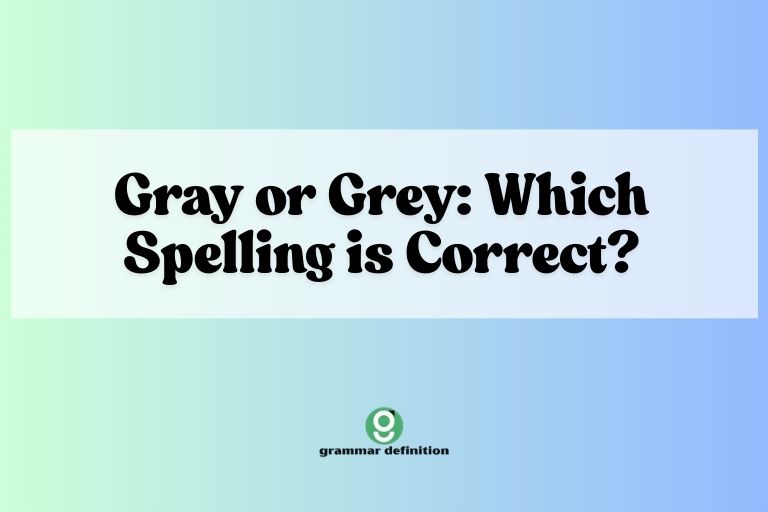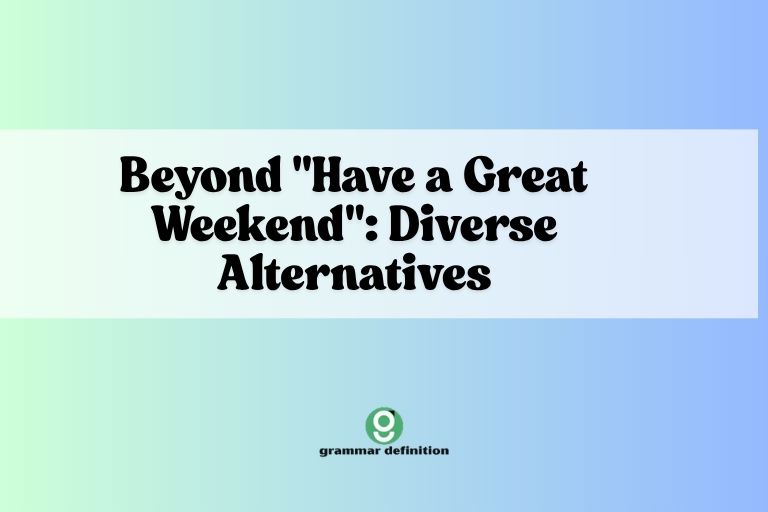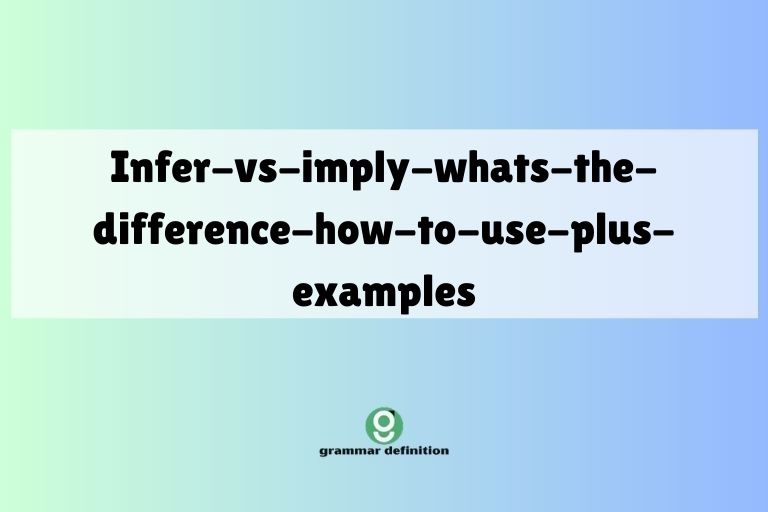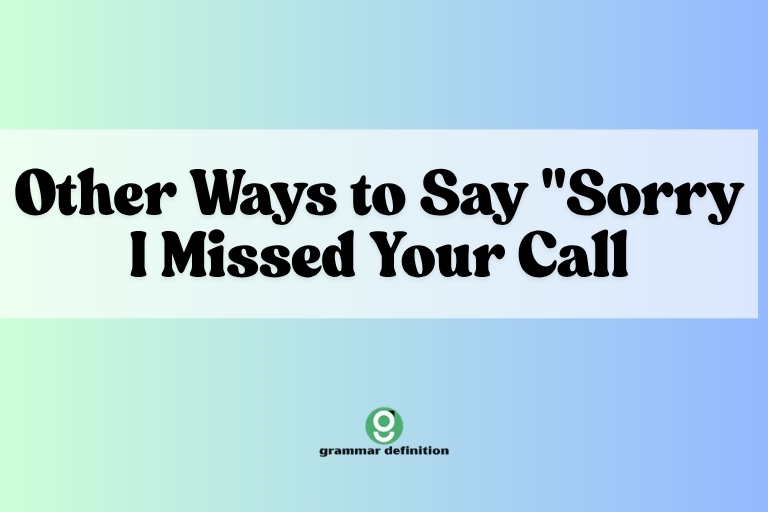Creative Alternatives to “Have a Good Day”: A Grammar Guide
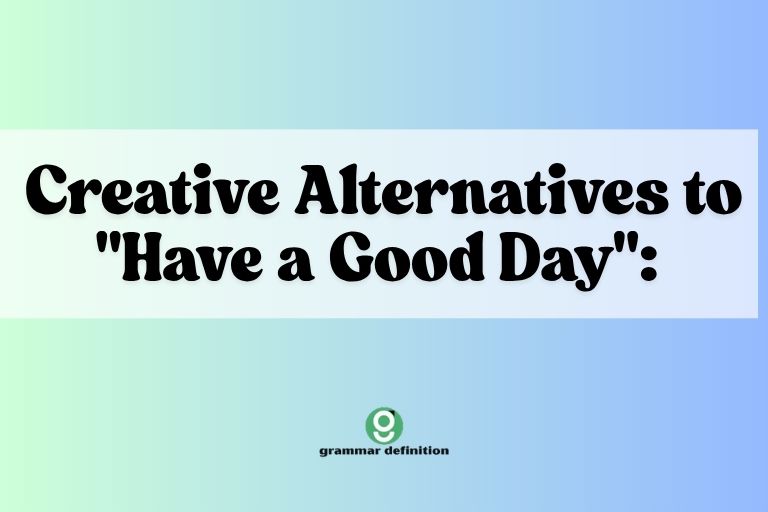
The phrase “Have a good day” is a common and polite way to end a conversation or interaction. However, its overuse can make it sound generic and impersonal.
Expanding your vocabulary with creative alternatives not only makes your communication more engaging but also demonstrates your command of the English language. This article explores various ways to express well wishes, focusing on grammar, context, and appropriate usage.
Whether you’re a student, a professional, or simply someone looking to add flair to your language, this guide will provide you with the tools to wish others well in a more meaningful and memorable way.
This comprehensive guide is designed to help you understand the nuances of different phrases, ensuring you choose the most appropriate expression for any situation. By mastering these alternatives, you’ll be able to communicate more effectively and leave a lasting positive impression.
Table of Contents
- Introduction
- Definition and Purpose
- Structural Breakdown
- Types and Categories of Alternatives
- Examples of Creative Alternatives
- Usage Rules and Considerations
- Common Mistakes to Avoid
- Practice Exercises
- Advanced Topics
- Frequently Asked Questions (FAQ)
- Conclusion
Definition and Purpose
The phrase “Have a good day” is a standard valediction, a polite expression used to convey well wishes to someone as they depart or as an interaction concludes. Its primary function is to express goodwill and positivity, aiming to leave the recipient with a favorable sentiment.
While simple and universally understood, its frequent use can sometimes diminish its impact, leading to a desire for more creative and personalized alternatives.
Alternatives to “Have a good day” serve the same fundamental purpose: to wish someone well. However, they offer the opportunity to tailor the message to the specific context, relationship, or activity.
These alternatives can range from simple variations to more elaborate expressions, reflecting a deeper level of care and consideration.
The choice of alternative depends on several factors, including the formality of the situation, the relationship between the speakers, and the intended tone. For example, a formal setting might call for a more sophisticated expression, while a casual encounter could benefit from a more relaxed and informal greeting.
Structural Breakdown
The basic structure of “Have a good day” is an imperative sentence, instructing the listener to experience a positive day. It follows a simple subject-verb-object order, where the implied subject is “you,” the verb is “have,” and “a good day” is the object.
Understanding this structure allows us to deconstruct and reconstruct the phrase, creating variations that maintain the same core meaning while adding a touch of originality.
Many alternatives follow a similar structure, often using different verbs or adjectives to modify the desired outcome. For instance, phrases like “Enjoy your day” or “Wishing you a pleasant day” retain the imperative or wish-based structure while substituting the verb “have” with “enjoy” or “wishing.”
Other alternatives might employ different sentence structures altogether, such as using a declarative sentence to express hope or expectation. For example, “I hope you have a great day” or “May your day be filled with joy” shift the focus from a direct command to a statement of personal hope or a blessing.
Types and Categories of Alternatives
Creative alternatives to “Have a good day” can be categorized based on their specific focus or intention. Understanding these categories can help you choose the most appropriate phrase for different situations.
General Well Wishes
These are broad expressions of goodwill that can be used in a variety of contexts. They aim to convey a general sense of positivity and optimism without being tied to any specific activity or event.
Examples include “Have a great day,” “Enjoy your day,” and “Wishing you well.”
Activity-Specific Wishes
These phrases are tailored to the specific activity the person is about to undertake. They demonstrate a level of attentiveness and consideration for the individual’s plans.
Examples include “Have a productive meeting,” “Enjoy your vacation,” and “Good luck with your presentation.”
Expressions of Encouragement
These phrases are designed to provide motivation and support, particularly when someone is facing a challenge or undertaking a difficult task. They offer a boost of confidence and encouragement.
Examples include “You’ve got this,” “Knock ’em dead,” and “I’m rooting for you.”
Positive Affirmations
These phrases express positive beliefs or hopes for the person’s day. They are often more personal and heartfelt, aiming to instill a sense of confidence and well-being.
Examples include “May your day be filled with joy,” “Hope you have a day as amazing as you are,” and “Wishing you sunshine and smiles.”
Informal and Casual Greetings
These phrases are suitable for casual interactions with friends, family, or close colleagues. They are often more relaxed and lighthearted, reflecting the informal nature of the relationship.
Examples include “Take it easy,” “Catch you later,” and “See ya!”
Examples of Creative Alternatives
Here are some examples of creative alternatives to “Have a good day,” categorized for clarity and ease of use.
General Well Wishes Examples
This table provides a list of general well wishes that can be used in a variety of contexts. These phrases are suitable for both formal and informal situations, depending on the specific wording and tone.
| Phrase | Context | Explanation |
|---|---|---|
| Have a great day! | General | A simple and positive wish for a good day. |
| Enjoy your day! | General | Encourages the person to find pleasure in their day. |
| Wishing you a pleasant day. | Formal/General | A more formal and polite expression of goodwill. |
| Have a wonderful day! | General | Similar to “Have a great day,” but with a stronger emphasis on positivity. |
| Hope your day is fantastic! | General | Expresses a hope for an exceptional day. |
| May your day be filled with joy. | General/Heartfelt | A more poetic and heartfelt expression of well wishes. |
| Have a good one! | Informal/General | A casual and shortened version of “Have a good day.” |
| All the best for the day ahead. | Formal/General | A sophisticated and polite way to wish someone well. |
| Wishing you sunshine and smiles. | General/Positive | A cheerful and optimistic wish. |
| Have a marvelous day! | General | Similar to “Have a great day,” but with a stronger emphasis on positivity. |
| Hope your day is amazing! | General | Expresses a hope for an exceptional day. |
| May your day be filled with happiness. | General/Heartfelt | A more poetic and heartfelt expression of well wishes. |
| Have a good one! | Informal/General | A casual and shortened version of “Have a good day.” |
| All the best for the day ahead. | Formal/General | A sophisticated and polite way to wish someone well. |
| Wishing you bright day. | General/Positive | A cheerful and optimistic wish. |
| Have a splendid day! | General | A positive wish for a good day. |
| Enjoy every moment of your day! | General | Encourages the person to find pleasure in their day. |
| Wishing you a delightful day. | Formal/General | A more formal and polite expression of goodwill. |
| Have a fabulous day! | General | Similar to “Have a great day,” but with a stronger emphasis on positivity. |
| Hope your day is wonderful! | General | Expresses a hope for an exceptional day. |
| May your day be filled with laughter. | General/Heartfelt | A more poetic and heartfelt expression of well wishes. |
| Have a good day! | Informal/General | A casual and shortened version of “Have a good day.” |
| All the best for the day. | Formal/General | A sophisticated and polite way to wish someone well. |
| Wishing you a happy day. | General/Positive | A cheerful and optimistic wish. |
Activity-Specific Wishes Examples
This table provides examples of activity-specific wishes, tailored to the particular task or event the person is undertaking. These phrases show that you are paying attention to their plans and offering relevant support.
| Phrase | Context | Explanation |
|---|---|---|
| Have a productive meeting! | Work/Meetings | Wishes the person success and efficiency in their meeting. |
| Enjoy your vacation! | Travel/Vacation | Expresses hope that the person has a relaxing and enjoyable vacation. |
| Good luck with your presentation! | Work/Presentations | Offers support and encouragement for a presentation. |
| Have a safe trip! | Travel | Wishes the person safety during their travels. |
| Break a leg! | Performance/Theater | An idiomatic expression wishing someone good luck, especially in a performance. |
| Hope your interview goes well! | Job Interviews | Expresses hope for a successful job interview. |
| Have a great workout! | Exercise/Fitness | Wishes the person an effective and enjoyable workout session. |
| Enjoy your meal! | Dining | A polite expression wishing someone enjoyment of their meal. |
| Have fun at the party! | Social Events | Wishes the person enjoyment at a social gathering. |
| Have a successful surgery! | Medical Procedures | Wishes the person a successful medical procedure. |
| Have a productive session! | Work/Meetings | Wishes the person success and efficiency in their session. |
| Enjoy your journey! | Travel/Vacation | Expresses hope that the person has a relaxing and enjoyable vacation. |
| Good luck with your speech! | Work/Presentations | Offers support and encouragement for a speech. |
| Have a safe journey! | Travel | Wishes the person safety during their travels. |
| Knock them dead! | Performance/Theater | An idiomatic expression wishing someone good luck, especially in a performance. |
| Hope your meeting is productive! | Job Interviews | Expresses hope for a successful job interview. |
| Have a great run! | Exercise/Fitness | Wishes the person an effective and enjoyable run. |
| Enjoy your lunch! | Dining | A polite expression wishing someone enjoyment of their meal. |
| Have fun at the concert! | Social Events | Wishes the person enjoyment at a social gathering. |
| Have a fast recovery! | Medical Procedures | Wishes the person a successful medical procedure. |
Encouragement Examples
This table offers phrases that provide encouragement and support, particularly when someone is facing a challenge or undertaking a difficult task. These expressions aim to boost confidence and motivation.
| Phrase | Context | Explanation |
|---|---|---|
| You’ve got this! | General/Challenging Tasks | A simple and direct expression of confidence in the person’s ability. |
| Knock ’em dead! | Performance/Competition | An idiomatic expression wishing someone great success and impact. |
| I’m rooting for you! | General/Support | Expresses strong support and encouragement. |
| Believe in yourself! | General/Self-Doubt | Encourages self-confidence and belief in one’s abilities. |
| You can do it! | General/Challenging Tasks | A simple and encouraging statement of belief in the person’s success. |
| Keep up the great work! | Work/Effort | Acknowledges and encourages continued effort and achievement. |
| Don’t give up! | Challenges/Difficulties | Encourages perseverance and resilience in the face of adversity. |
| Stay strong! | Challenges/Difficulties | Offers support and encouragement to remain resilient. |
| You’re doing great! | Work/Effort | Acknowledges and encourages continued effort and achievement. |
| Never give up! | Challenges/Difficulties | Encourages perseverance and resilience in the face of adversity. |
| You’re amazing! | General/Challenging Tasks | A simple and direct expression of confidence in the person’s ability. |
| Rock it! | Performance/Competition | An idiomatic expression wishing someone great success and impact. |
| I’m supporting you! | General/Support | Expresses strong support and encouragement. |
| Trust yourself! | General/Self-Doubt | Encourages self-confidence and belief in one’s abilities. |
| You will succeed! | General/Challenging Tasks | A simple and encouraging statement of belief in the person’s success. |
| Keep going! | Work/Effort | Acknowledges and encourages continued effort and achievement. |
| Don’t lose hope! | Challenges/Difficulties | Encourages perseverance and resilience in the face of adversity. |
| Be strong! | Challenges/Difficulties | Offers support and encouragement to remain resilient. |
| You’re the best! | Work/Effort | Acknowledges and encourages continued effort and achievement. |
| Never surrender! | Challenges/Difficulties | Encourages perseverance and resilience in the face of adversity. |
Usage Rules and Considerations
Choosing the right alternative to “Have a good day” depends on several factors. The formality of the situation is a key consideration.
In formal settings, such as business meetings or interactions with superiors, it’s best to use more sophisticated and polite expressions like “Wishing you a pleasant day” or “All the best for the day ahead.” In contrast, informal settings allow for more casual and relaxed greetings like “Take it easy” or “See ya!”
The relationship between the speakers also plays a crucial role. With close friends and family, you can use more personal and heartfelt expressions like “Hope you have a day as amazing as you are” or “Wishing you sunshine and smiles.” With acquaintances or strangers, it’s generally best to stick to more generic and polite phrases like “Have a great day” or “Enjoy your day.”
The specific context or activity is another important factor. If you know the person is about to undertake a specific task or event, you can tailor your well wishes accordingly.
For example, if someone is heading into a meeting, you could say “Have a productive meeting!” or if they’re going on vacation, you could say “Enjoy your vacation!”
Common Mistakes to Avoid
One common mistake is using overly formal language in informal settings, which can sound stilted or insincere. For example, saying “Wishing you a most auspicious day” to a close friend might come across as unnatural or humorous.
Another mistake is using overly casual language in formal settings, which can be perceived as disrespectful or unprofessional. For example, saying “Catch you later, dude” to your boss is generally not appropriate.
It’s also important to avoid using phrases that are culturally insensitive or potentially offensive. Be mindful of cultural differences and avoid making assumptions about someone’s beliefs or values.
Finally, be careful not to overuse any particular alternative, as this can defeat the purpose of adding variety and personalization. Mix and match different expressions to keep your communication fresh and engaging.
Here are some examples of common mistakes and their corrected versions:
| Incorrect | Correct | Explanation |
|---|---|---|
| Wishing you a most auspicious day! (to a friend) | Have a great day! | Too formal for a casual setting. |
| Catch you later, dude! (to your boss) | Have a good day, sir/madam! | Too informal for a professional setting. |
| Hope you have a blessed day! (to someone of unknown faith) | Hope you have a good day! | Avoid potentially insensitive religious references. |
| Have a good one! (repeatedly to everyone) | Vary your greetings. | Avoid overuse of any single phrase. |
Practice Exercises
Test your understanding of creative alternatives to “Have a good day” with these practice exercises.
Exercise 1: Choose the best alternative for each situation.
| Situation | Possible Alternatives | Correct Answer |
|---|---|---|
| Ending a phone call with a colleague after discussing a project. | a) See ya! b) Have a productive evening! c) All the best for the day ahead. | c) All the best for the day ahead. |
| Saying goodbye to a friend who is about to perform on stage. | a) Have a good one! b) Break a leg! c) Enjoy your day! | b) Break a leg! |
| Wishing your family member well before they go on a long trip. | a) Have a safe trip! b) Take it easy! c) Knock ’em dead! | a) Have a safe trip! |
| Ending a conversation with a customer at a store. | a) Catch you later! b) Have a great day! c) You’ve got this! | b) Have a great day! |
| Encouraging a teammate before a competition. | a) Enjoy your day! b) I’m rooting for you! c) Have a good one! | b) I’m rooting for you! |
| Wishing someone well before their job interview. | a) See you later! b) Hope your interview goes well! c) Have a good day. | b) Hope your interview goes well! |
| Wishing a coworker well before their big presentation. | a) Have a good time! b) Knock ’em dead! c) Have a good day. | b) Knock ’em dead! |
| Wishing a friend well before their surgery. | a) Have a good time! b) Have a successful surgery! c) Have a good day. | b) Have a successful surgery! |
| Wishing a student well before their final exam. | a) Have a good time! b) You’ve got this! c) Have a good day. | b) You’ve got this! |
| Wishing a child well before their first day of school. | a) Have a good time! b) Have a wonderful day! c) Have a good day. | b) Have a wonderful day! |
Exercise 2: Rewrite the following sentences using a creative alternative to “Have a good day.”
- Have a good day before your important meeting.
- Have a good day before your big performance.
- Have a good day before your surgery.
- Have a good day before your job interview.
- Have a good day before your first date.
- Have a good day before your long trip.
- Have a good day before your exam.
- Have a good day before your presentation.
- Have a good day before your workout.
- Have a good day before your family gathering.
Answer Key:
- Have a productive meeting!
- Break a leg!
- Have a successful surgery!
- Hope your interview goes well!
- Have a wonderful first date!
- Have a safe trip!
- You’ve got this on the exam!
- Knock ’em dead during your presentation!
- Have a great workout!
- Have a wonderful time at the family gathering!
Advanced Topics
For advanced learners, exploring the nuances of regional variations and idiomatic expressions can further enhance your communication skills. Different regions may have their own unique ways of expressing well wishes, and understanding these variations can help you better connect with people from diverse backgrounds.
Idiomatic expressions, such as “Break a leg” or “Knock ’em dead,” add a layer of cultural richness and expressiveness to your language. However, it’s important to use these expressions appropriately and be aware of their potential for misinterpretation.
Additionally, exploring the etymology and historical context of different phrases can provide a deeper understanding of their meaning and usage. This can help you appreciate the evolution of language and make more informed choices about your communication style.
Frequently Asked Questions (FAQ)
- Is it ever inappropriate to say “Have a good day”?While generally acceptable, “Have a good day” can sound generic. Consider the context and your relationship with the person. If you know they’re facing a difficult situation, a more empathetic or specific message might be better. If you’ve already said it multiple times in a short period, try a different phrase to avoid repetition.
- What’s the best alternative to use in a formal setting?In formal settings, opt for phrases like “Wishing you a pleasant day,” “All the best for the day ahead,” or “I trust you’ll have a productive day.” These options are polite and professional, suitable for interactions with superiors, clients, or in formal business contexts.
- How can I make my well wishes more personal?Personalize your well wishes by referencing something specific about the person or their day. For example, if you know they have a presentation, say “Good luck with your presentation!” or if they’re going on vacation, say “Enjoy your vacation!” This shows you’re attentive and thoughtful.
- Are there any alternatives that are universally understood?Phrases like “Have a great day” and “Enjoy your day” are widely understood and generally safe to use in most situations. They convey positivity without being overly specific or potentially culturally insensitive.
- How do I avoid sounding repetitive when wishing multiple people well?Vary your phrases by using a mix of general well wishes, activity-specific wishes, and expressions of encouragement. Keep a mental list of alternatives and rotate them throughout the day. You can also tailor your message to each individual based on your interaction with them.
- What if I don’t know what the person is doing that day?If you’re unsure of their plans, stick to general well wishes like “Have a good one,” “Wishing you well,” or “Hope you have a pleasant day.” These phrases are neutral and appropriate for any situation.
- Can I use humor when wishing someone well?Humor can be a great way to lighten the mood, but be mindful of your audience and the context. Avoid jokes that could be misinterpreted or offensive. If you’re unsure, it’s best to err on the side of caution and stick to more straightforward expressions of goodwill.
- Is it okay to use slang or informal language in professional settings?Generally, it’s best to avoid slang or overly informal language in professional settings, especially in formal communications or interactions with superiors. However, in more casual office environments or with close colleagues, a relaxed tone may be acceptable. Use your judgment and consider the company culture.
Conclusion
Mastering creative alternatives to “Have a good day” is a valuable skill that can enhance your communication and leave a lasting positive impression. By understanding the nuances of different phrases, considering the context and relationship, and avoiding common mistakes, you can express your well wishes in a more meaningful and memorable way.
Remember to tailor your language to the specific situation and audience, and don’t be afraid to experiment with different expressions to find what works best for you. With practice and attention to detail, you’ll be able to communicate more effectively and build stronger relationships with those around you.
The key takeaway is that variety and thoughtfulness can transform a simple valediction into a genuine expression of care and consideration. So, go forth and spread some positivity with your newfound vocabulary!


